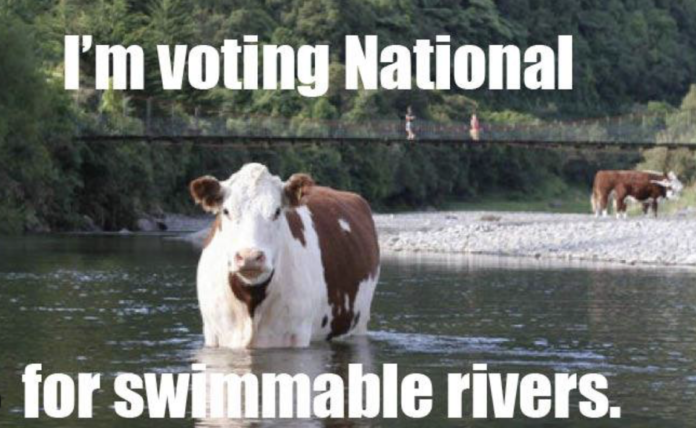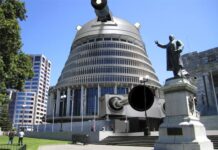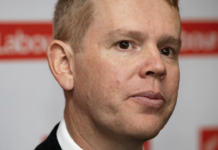The COP28 countdown is on.
Over 100 world leaders are expected to attend this year’s UN Climate Change Conference in the United Arab Emirates (UAE), which starts next Thursday.
Among the VIPs confirmed for the Dubai summit are the UK’s Rishi Sunak and Brazil’s Lula da Silva – along with King Charles and Pope Francis.
On the other hand, Joe Biden and Xi Jinping are both unlikely to join in – and neither is Australia’s Anthony Albanese.
It remains to be seen which camp New Zealand’s new Prime Minister will fall into. Christopher Luxon is only expected to be formally sworn in as PM on Monday, following the conclusion of several weeks of coalition negotiations to form a new government.
But in theory, this would still leave plenty of time for Luxon to fly to the ‘World Climate Action Summit’ opening event for world leaders, which is being held from December 1-2.
Luxon positioned his National Party firmly in the centre during the election campaign, committing New Zealand to meeting its emissions reductions targets and telling sceptics ‘you can’t be a climate denier or a climate minimalist in 2023’.
Beyond the issue of climate change itself, COP28 would be a valuable initial networking and relationship-forming opportunity for New Zealand’s new Prime Minister. And to some extent, the Dubai gathering would be a make-up affair for Luxon, after he missed the APEC summit in San Francisco in mid-November due to the ongoing coalition negotiations.
It is safe to say that the ongoing war in Gaza between Israel and Hamas will be a major topic of sideline conversations at this year’s COP.
While Luxon missed the chance to meet Xi and Biden at APEC, COP28 would be a good chance for Luxon to hear the views of a range of other world leaders – particularly voices from across the Middle East.
Somewhat surprisingly, New Zealand’s former PM Jacinda Ardern never went to a COP summit during her six years in office. The last time a New Zealand PM was represented was in 2015, when John Key attended COP21 in Paris.
Coincidentally, 2015 was also the year that Key visited the Gulf states on a three-country tour of Kuwait, Saudi Arabia and the UAE that sought to jumpstart New Zealand’s bid to strike a free trade deal with the Gulf Cooperation Council (GCC). The bloc’s membership also includes Bahrain, Oman and Qatar.
In September, New Zealand’s then Labour government began talks with the UAE on a new bilateral Comprehensive Economic Partnership Agreement – or CEPA. The CEPA could be a stepping stone to finalising a wider free trade agreement with the GCC that has been in the works since 2006.
With trade opportunities in the Gulf beckoning and no end in sight to the war in Gaza, the Middle East is likely to be higher up the foreign affairs agenda for New Zealand than might have previously been thought.
On the climate front, COP28’s head appointed by host UAE, Dr Sultan al Jaber, has emphasised ‘inclusivity’ as a key plank of this year’s event. Bringing together a wide range of countries around the table, despite deepening geopolitical polarisation driven by the Gaza and Ukraine wars and tensions in the Indo-Pacific, may be the summit’s most impressive achievement.
Israel pledged in July to send a 1000-strong delegation to Dubai, led by both its Prime Minister and President. The size will now be greatly reduced – but, remarkably, Israel is still coming and will still have a pavilion at COP28. While the war has strained relations between the UAE and Israel that were normalised under the Abraham Accords in 2020, diplomatic ties remain in place.
Speaking shortly prior to the outbreak of the war that began on October 7, the UAE’s Ambassador to New Zealand, His Excellency Mr. Rashed Matar Alqemzi, told me in an interview that ‘we are bringing the world together’ and emphasised the welcome being extended by COP28 to women, religious organisations, youth and indigenous peoples.
In New Zealand’s case, this includes Māori, whose role at Expo 2020 in Dubai was ‘greatly valued’ according to Alqemzi. New Zealand’s Iwi Chairs Forum, a coalition of Māori tribal leaders, was given the task of leading a ‘Festival of Indigenous and Tribal Ideas’ during the Expo. Two years on, COP28 will be held on the same Expo 2020 site on Dubai’s southern fringe.
The aim for ‘full inclusivity’ is more controversial, however, when it refers to the involvement of oil companies and their executives at the summit – including Dr Sultan Al Jaber himself, who also heads the UAE’s state-owned oil company, ADNOC.
Since he was given the role in January, Al Jaber’s appointment has frequently been criticised by climate campaigners, with one likening it to putting a tobacco company in charge of the World Health Organization.
The counter-argument – as put by Al Jaber himself in a speech to oil company executives in October – is that fossil fuel producers are ‘central to the solution’ and need to stop ‘blocking progress’.
While these words are unlikely to convince campaigners who see greenwashing, there is some cause for optimism ahead of COP28.
A recent agenda for the summit released by Al Jaber called for a ‘responsible phase-down of unabated fossil fuels’ – a reference to the burning of oil, gas and coal without the use of carbon capture technology.
The call to ‘phase-down’ the use of at least some fossil fuels altogether represents a small, yet significant shift from earlier this year, when Al Jaber was called out by former UN climate head Christiana Figueres for speakingmerely of ‘phasing out fossil fuel emissions’.
On the other hand, ‘phase-down’ is weaker than the total ‘phase-out’ language used by a recent UN report and agreed upon by the EU as its negotiating position for COP28.
The debate over phasing-down vs. phasing-out is unlikely to go away any time soon.
The need for speed has to be balanced with fairness – especially for the world’s poorest.
In his agenda, Al Jaber called for global emissions reductions of 22 gigatons – almost half the current level – by 2030, but also for a ‘just energy transition’ that ensures energy supplies remain affordable and reliable to all.
Threading this needle will not be easy.
Some parallels might be drawn with New Zealand’s own attempts to reduce agricultural emissions, which make up half of the country’s greenhouse gases – mainly due to the methane produced by livestock.
After originally pledging to bring farming into the country’s Emissions Trading Scheme, Jacinda Ardern’s Labour-led Government agreed in 2019 to work with industry groups on an alternative pricing model and technologies to reduce agricultural emissions.
A deal was announced at the end of 2022, but it collapsed this year with key industry players and Christopher Luxon’s National Party withdrawing their support. Now in Government, National is delaying the introduction of a pricing system until 2030 – well beyond Sultan Al Jaber’s deadline for action.
At the global level, agriculture is a small contributor when it comes to emissions.
By far the lion’s share comes from the burning of fossil fuels – oil, gas and coal.
While the Gulf may be looking to a future beyond oil – and focusing on education, services and technology – the fact remains that there are plenty of players with a lot to lose and everything to gain from delaying the decarbonisation process.
New Zealand’s chequered experience with a joint government-industry effort to reduce agricultural emissions may offer a salutary lesson.
Keeping everyone at the table is harder than it looks.
Still, it is worth keeping the bigger picture in mind.
Al Jaber’s drive for inclusiveness is very much in keeping with the UAE’s current overall foreign policy stance.
Despite pressure from Western capitals, Abu Dhabi has steadfastly maintained relations with Moscow since Russia invaded Ukraine – and the UAE has resisted the temptation to cut its newly forged diplomatic ties with Israel, despite overwhelming backing on the ‘Arab street’ for the Palestinian cause.
Meanwhile, with COP28 just around the corner, Ambassador Alqemzi says his message for the summit’s critics is ‘let’s see what the UAE will do – and then we can talk again’.
It is a pivotal time for the Middle East.
Christopher Luxon could learn a great deal in Dubai.
Geoffrey Miller is the Democracy Project’s geopolitical analyst and writes on current New Zealand foreign policy and related geopolitical issues. He has lived in Germany and the Middle East and is a learner of Arabic and Russian. Disclosure: Geoffrey attended the recent Global Media Congress in the UAE as a guest of the organisers, the Emirates News Agency.





Do you get paid to write this column? I liked the song: https://www.youtube.com/watch?v=UxGudz1SvUs
“At the global level, agriculture is a small contributor when it comes to emissions.”
And that, is in and of itself, nuanced. Ol farts aye. Farts are as a result of what one eats. If one eats fart-fuel you’re going to fart your arse hole off. Fart power comes from an individuals gut biome. If my full contact sex person eats too much sugar while out driving I have to come to a sliding stop and run for it leaving the door swinging open as I head for the hills beyond the forests. Cows, such as the maligned beast above is depicting will fart, shit and piss all day if they’re fed junk grass grown with highly nitrogenous artificial ‘fertilisers’ AKA toxic lab built chemicals. Fertiliser technicians will concoct chemicals to drive cows ever faster to produce ever more milk thus ca-ching. Aye Boys?
And who’s behind forcing the farmers hand to over-stock and over-feed on toxic chemicalised
grass?
Why The Banks of course. The banks by their actions both devious and manipulative in conjunction with their minions, the mercantile firms AKA wrightsons, RD1 PGG etc and, of course, their well oiled, well lobbied Bankster Bitches being our politicians. Yes. It is that corrupt, but unlike most of the rest of the democratic world, our politicians carefully work within self-legalized parameters. The perfect crime, one might argue. One might also argue, that are our courts in on it too? Why not? Law makers are the same politicians already well oiled in the Lobby Boys
“By far the lion’s share comes from the burning of fossil fuels – oil, gas and coal.”
I have a house in a larger port town and I can see all the comings and goings. I love watching those massive cargo ships, tankers and container ships being nudged onto their moorings by the tugs.
I also see vast amounts of diesel fumes being huffed out of exhaust pipes the diameter of tanker trucks.
And if you go here and track the shipping there are tens of thousands of ships blowing out toxic chemicals including fuel particulates as they travel non stop around the planet.
Marine Traffic.
https://www.marinetraffic.com/en/ais/details/ports/1322?name=LYTTELTON&country=New-Zealand
A move in the right direction would be to mandate voting. We must vote. If we don’t vote, then this shit will get worse. Greedy Kiwi morons will rise like turds to the top while good people will be quietly killed off.
Ban the foreign ownership of our banking. That, should reduce the number of greedy psychopaths from interfering with our politics for their end games, ones I dare not think about at this point.
We AO/NZ’ers have a glorious country within which we can weather the storms coming but are we prepared to do the hard work to change a few fundamentals of the way we operate in order to keep ourselves safe?
Lets see shall we. Here comes luxon, seymour and peters. God help us to help ourselves then.
Not voting is effectively a vote of no confidence. It is every bit as legitimate as voting, and far more legitimate than making someone vote for a party they don’t believe in. I just can’t with this sort of nonsense. It leads directly to North Korea and Iraq (under Saddam) where everyone has to vote for their one party (or risk death).
Apologies to @ Geoffrey Miller. I might have commented twice by mistake.
I get the impression you are saying there will be a lot of talk but not much action at COP 28 to reduce carbon but that’s alright by the major players as their profits will continue.
I suspect that unless there is some sort of major disaster or miracle breakthrough things will get progressively worse & the cost to restore will overwhelm the ability to pay leading to economic collapse.
Once Trump hock’d the crown you can’t buy it back
It starts on the 30th and runs to the 12th. CLuxon will be here for parliaments opening on the 5th.
So it is possible to be there for the 30th and Dec 1-2 period to meet people.
But what will he have to say? His CC Minister is outside Cabinet. As is the Environment Minister. And a former Fed Farmers boss is associate. Cancelling PT projects.
And fobbing off the anti Paris Accord policies in a coalition agreement with this in it.
Reduce the regulatory burden on farmers by ceasing the implementation of Significant Natural Areas, replace the National Policy Statement for Freshwater Management to rebalance Te Mana o te Wai to better reflect the interests of all water users, maintain a split-gas approach to methane and carbon dioxide through to 2050 and review the methane science and targets in 2024, improve Farm Environment Plans so they are more cost-effective and pragmatic, and enable farmers and landowners to offset sequestration against their on-farm emissions.
It’s more likely CLuxon never goes to one of these events while PM.
The reason we can not reduce global emissions is because we do not have the military might to enforce a new regime. Cope 21 or whatever acronym you use for cope-ium is one hell of a drug. Some coping reasons is basically talking up shit ideas like fines and penalties, and for these reasons fines and penalties will make us all feel better. That we finally got Xi and Biden talking. The reality is we are procrastinating making up coping reasons like a Marvel movie trying to cope with there shit boxes office take by blaming the fans and repeating the “narritive” ie misogynist, rape culture, or for these coping reasons our shit climate change ideas are not finding traction because of male masculinity and patriarchy. Truth is New Zealand can’t build shit. Question is how Biden, Xi or Luxon can walk into a climate change conference with there cities looking and acting the way they are and expect to produce better results. You guys are just cracked in the head.
Up to 70,000 people could be attending Cop 28…. Will they walk , cycle , or use electric vehicles to arrive..?? The menu to feed these climate warriors has a large vegetarian selection for the participants …very sensible, raw I presume, as cooking uses global warming energy….the results from this talk fest should be interesting, as the other 27 meetings have shown, that yapping works and the scientific results show….Climate Corp is thriving, and as a successful business it is an example to all tax payers worldwide that hot air can be profitable and fun….
Meanwhile Nactfirst are fracking cracking and destroying our oceans, good for you Te Robs Knob ,you fuck wit. And how much of the rewards go into government coffers Knob, I dare you?
NSC that’s not very nice,are you always so nasty.
If you think ordinary people are going to allow themselves to be impoverished you’re kidding yourself: